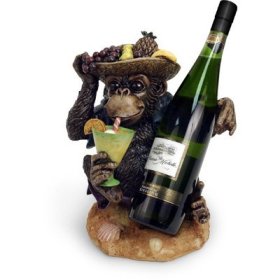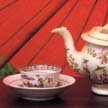Wine, Tea and Chimpanzees

While some bloggers have had fun with the story this week, one detail in particular caught my eye and reminded me of a recent experience. According to news reports, the apes are enjoying their wine as part of a cocktail mixed with tea. Not that I'm advocating this strange brew in one glass! But it is interesting that a healthy primate lifestyle these days is supposed to include both red wine and tea.
I've been attending wine tasting events for more than 16 years, but recently I attended my first tea tasting event at a fabulous tea shop in Higganum, Conn., recommended by my friend Emily. As our impassioned and knowledgable hostess covered the basics of tea, I was impressed by how many similarities there are between the tea-tasting and wine-tasting experience.
For one thing, terroir matters in tea as well as wine. For example, in higher elevations tea grows less vigorously but with more complexity than tea grown in lush valley locales. But, as with wine, the artisan processing the tea leaves exercises great control over the final product. Unlike wine and its hundreds of varietals, tea basically comes from one plant, camellia sinensis. The variety of tea produced depends on the handling of the leaves and the degree of oxidation that is encouraged before packaging. Black tea, the most strongly flavored, is the most heavily oxidized.
Also, tea tasting itself is more or less like tasting wine. After noting the color, you let your nose take in the aromas so that you can judge the character of the tea and mentally compare it to others you've had before. We tasted and compared:
- Ancient Snow Sprouts, a rare green tea from China's Yunnan Province
- Golden Xuan, an oolong or semi-oxidized tea from China's Fujian Province
- Assam Supreme, a black or fully oxidized tea from India

As we tasted, our hostess made the connection for us between wine and tea as agents of optimal health. A healthy lifestyle, she argued, should include tea in the morning and afternoon, and wine with dinner in the evening. I have been enjoying teas for several years now, but I have now vowed to make tea an even more regular part of my diet, as is wine. Estate teas or loose leaf teas contain oils that help promote good health, an effect that is minimalized, unfortunately, in most of the tea made from tea bags found on your supermarket shelf. She referred to this tea as "tea dust."
All of this may seem like a long side road from a story about some Hungarian apes. But for those wine drinkers who are excited by the health-promoting properties of red wine, in addition to the sheer fun of enjoying good wine, you should be checking out good teas as well. Hell, even Budapest baboons know that!



3 Comments:
Hey John -
Wow - I got a mention on your blog! V exciting :-)
I'm glad you enjoyed Sundial - we're headed up there tomorrow. I have GCs burning a hole in my pocket and Yixing tea pots calling my name :-)
-E
E,credit where credit is due. Have a great time. Got to get me one of those, too.
Thanks for the warning. Another expensive habit could mean trouble on the homefront. ;-)
Post a Comment
<< Home